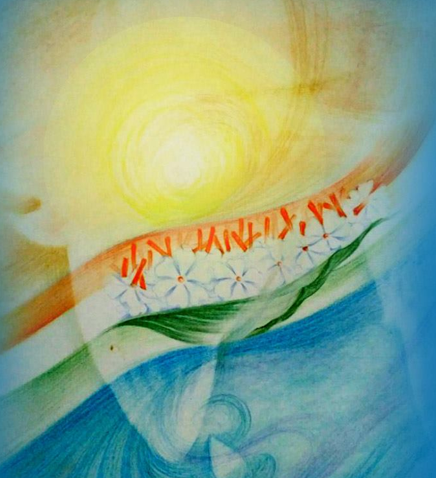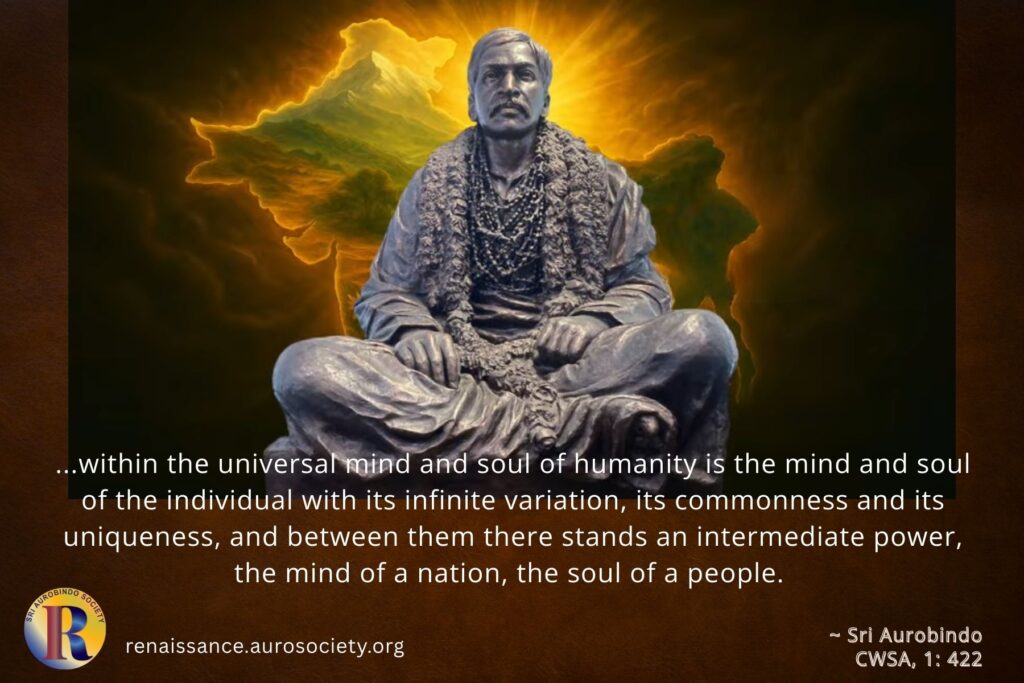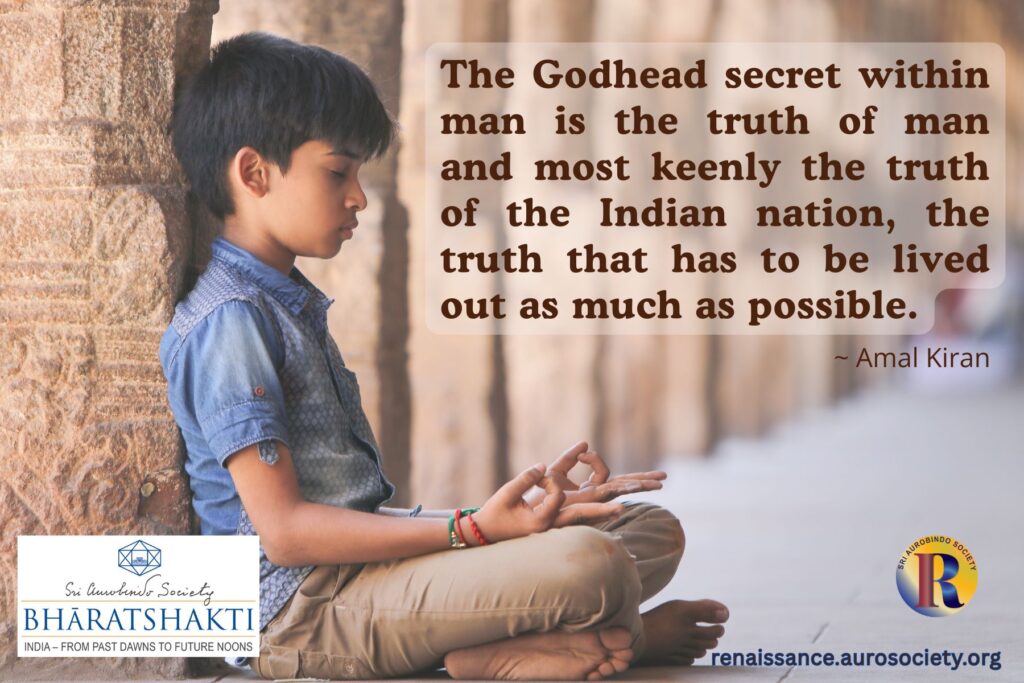Volume 1, Issue 3
Author: Agali Venkappa Sastri
Continued from Part 2
If by nationalism we mean the force behind all life and expression, the sense of solidarity of a people, Indian nationalism is as old as Indian history, in a sense, anterior to it. The historical process is but an unfolding of the Spirit, the Truth of which was realized by the Fathers of the Race, the Rishis, in the Vedic Age.
All progress is an expansion of consciousness. We have arrived at the level of the mind which is an intermediary phase of consciousness. Just as there are levels below the conscious mind, there are levels above and not till consciousness in its entirety is grasped, not till Truth-consciousness is developed in its inclusive aspects of integral awareness, integral force, and integral delight together constituting fullness of being in the individual, the universal and the transcendent, will the arc be complete.
Once the Truth in its totality is experienced, it carries with it the power to effectuate itself in life as well. That is the cardinal fact regarding all evolution and that is how the Rishis began in the dim past determining the lines of India’s destiny.
But before we explore the lines on which the nation and nationalism developed in India, let us briefly explore nationalism in the West.
Nation-making in the West: A Historical Perspective
The process of nation-making has been different in the West[1]. While not being able to ignore the subjective factor of will and consciousness, they have tended to put emphasis on objective criteria of language, race, territory, religion and civilisation, citizenship in a state, etc.
The ancient world of Greece and Rome did not achieve nationalism. Greece is identified with the city-state, while Rome hastened to expand into an empire without pausing to perfect the nation-unit so that, owing to weakness within, she fell an easy victim to the barbarian.
The medieval world witnessed the long strife between the Church and the Empire during which men’s loyalties were extraterritorial and extra-national. It was only at the time of the Renaissance that strong monarchies were established on the ruins of the feudal system and nations like England, France, Spain, Portugal and Switzerland emerged.
The Reformation immensely added to the prestige of the Kings by reducing the Church to a subordinate position. Thenceforward it became a strife of classes within the nation; while externally it stood differentiated from other nation entities. The middle classes aligned themselves with the King and helped to supplant the barons whose power had been dwindling with the decay of the feudal order.
After that English history was merely the record of a struggle for rights, at first and for long of the upper and the middle classes and then by slow degrees, of the workers and the artisans, the power of Labour.
The transformation of the monarchical sovereignty into the sovereignty of the people, or more accurately, the shifting of the organic control from the throne to the aristocracy, thence to the bourgeoisie, and again to the whole people – the latter two steps comprising the rapid evolution of the last eighty years, – was only a question of time.
~ CWSA, Vol. 25, p. 450
It is a social and political evolution. In the course of the struggle the limitations of political democracy were realized; economic motives were added. Notions of liberty and equality in the West still suffer from imperfect grasp and imperfect statement arising from external, experimental attitudes.
It is this same external mechanical tendency that accounts for the highly organized states today. The nation-state is the culmination of the tendency to centralization, political organization, the logical development of objective unity.
Focus on External Evolution
Sri Aurobindo wrote long ago:
The near future of the human group would seem to be the nation, self-governing, politically free, but aiming at perfect social and economic organization, and for that purpose giving up all individual liberty into the hands of the organized national State.
As France was in the end of the eighteenth and beginning of the nineteenth century the great propagandist and experimental workshop of political liberty and equality, so Germany has been in the end of the nineteenth and beginning of the twentieth century the great propagandist and experimental workshop of the idea of the organized State.
~ ibid, pp. 346-347
This external evolution, this belief in organization, faith in institutions and ingenious machinery of administration to the neglect of the inner life of the peoples is responsible for the confusion in regard to the relation between the State and the individual, the failure to arrive at a just equation between the two poles of life.
The external view helps us to understand neither the individual nor the nation. Lacking profound subjectivism which alone helps us to get at the core of the individual or society, and impelled by vital urges, vital life, and vital mind, the European rushes from experiment to experiment and calls this progress, but the central questions abide, gather force and issue in upheavals and cataclysms.
The whole process of Nature depends upon a balancing and a constant tendency to harmony between two poles of life; the individual whom the aggregate or whole nourishes and the aggregate which the individual helps to constitute. Human life forms no exception to the rule. Therefore the perfection of human life must involve in itself the unaccomplished harmony between these two poles of our existence; the individual and the social aggregate.
~ ibid, p. 285
The Nazi and the Fascist orientation of nationalism with their contempt for and hostility to other nations and the annihilation of individual rights within the State have mechanised society and made nationalism itself an execrable doctrine.
Nationalism, rightly understood, need not necessarily lead to the same conclusions or the same policies. Nor need we be deprecated nor is it possible to desist because of the errors, lapses and enormities of some one nation. “The misuse of great powers is no argument against their right use.” (ibid, p. 42)

Nationalism – A Subjective Approach
Nationalism has yet to find itself among the peoples of the earth. The nation has a soul like the individual. In Sri Aurobindo’s words:
The nation or society, like the individual, has a body, an organic life, a moral and aesthetic temperament, a developing mind and a soul behind all these signs and powers for the sake of which they exist. One may say even that, like the individual, it essentially is a soul rather than has one; it is a group-soul that, once having attained to a separate distinctness, must become more and more self-conscious and find itself more and more fully as it develops its corporate action and mentality and its organic self-expressive life.
~ ibid, p. 35
If an individual takes long to find his soul, nations will take yet longer because of the complex elements they contain. “The group-soul is much more complex because it has a great number of self-conscious individuals for the constituents of its physical being and not an association of merely vital subconscious cells.” (ibid, p. 36)
The Nation-state which is a type most familiarly developed in the West is but a power phenomenon, not a spiritual entity. A less objective view, however, of societies and institutions has come to prevail since the beginning of the individualistic phase of thinking.
Subjectivism is the right road but “a perilous adventure.” Spirituality is the single consummation, the goal of all subjectivism, of nations or individuals. But it means the piercing of many veils before one gets to the centre. The subjective opens up the whole realm of the inner vital, the mental, the moral, and the aesthetic, and one has to penetrate to the inmost and then follow an ascending curve.
In Sri Aurobindo’s words: “First, there must be a conversion inwards, a going within to find the inmost psychic being and bring it out to the front, disclosing at the same time the inner mind, inner vital, inner physical parts of the nature. Next, there must be an ascension, a series of conversions upwards and a turning down to convert the lower parts.” (CWSA, Vol. 28, p. 84)
But it is possible that nations and individuals in their subjective search for the self may get stuck in the ‘Valley of the False Glimmer.’ The glaring example of a nation deflected in its great subjective endeavour is Germany.
That befell her [Germany] which sometimes befalls the seeker on the path of Yoga, the art of conscious self-finding, – a path exposed to far profounder perils than beset ordinarily the average man, – when he follows a false light to his spiritual ruin.
She has mistaken her vital ego for her self; she has sought for her soul and found only her force. For she has said like the Asura, ‘I am my body, my life, my mind and temperament’, and become attached with a Titanic force to these; especially she has said, I am my life and body’ and than that there can be no greater mistake for man or nation.
~ CWSA, Vol. 25, p. 42
SEE:
Nation and Nationalism: Some Passages from Bande Mataram
Nationalism expresses a vital truth of Nature. It is a distinct flowering of humanity. Nationalism is identified with national honour and prestige to secure which a powerful State machine becomes necessary. Economic, social and cultural ambitions reinforce the sentiment of national pride and egoism. A real cult of power develops and nationalism becomes a sort of religion with prestige and power as its supreme gods. That had been the course of German nationalism, or nationalism in much of the West, and all these irrational applications and insane dogmas have to be avoided.
We could do so only by taking a spiritual view of man and spiritual view of society which will provide the right basis of relationship between the two poles of life. This harmony between the individual and society, vyashti and samashti, on the one hand assigning the highest value to the individual and on the other assuring social stability – the two conditions of progress in life, the two indispensable factors of the manifestation of the Divine on earth, was conceived and worked out in detail in the India of long ago by the Rishis.
Continued in Part 4…
Notes
[1] The three stages of the European cycle of nation-building have been traced with great insight by Sri Aurobindo in Chapters XII and XIII of the Ideal of Human Unity.
Cover image: Bhārata Mahima, by Ritam Upadhyay



